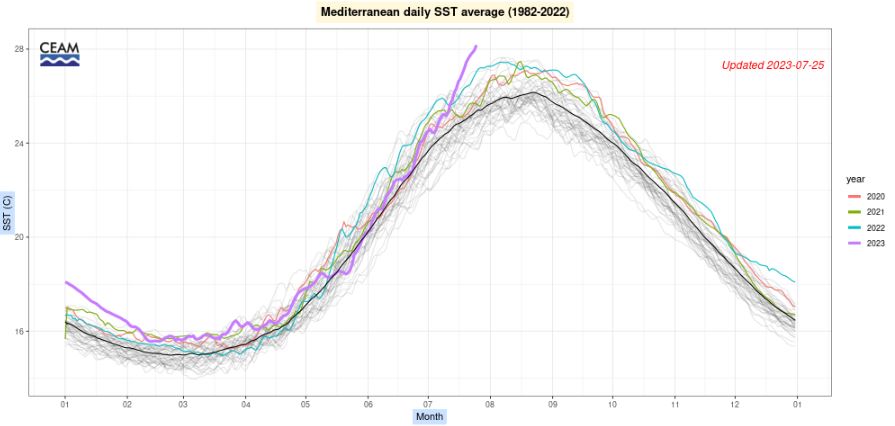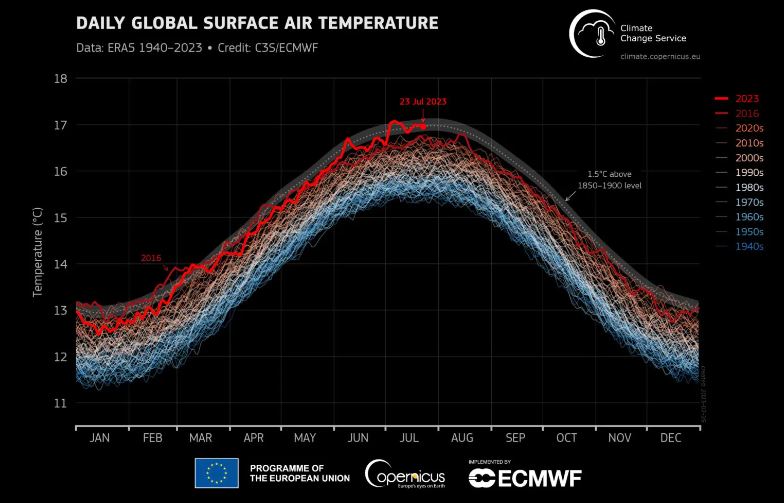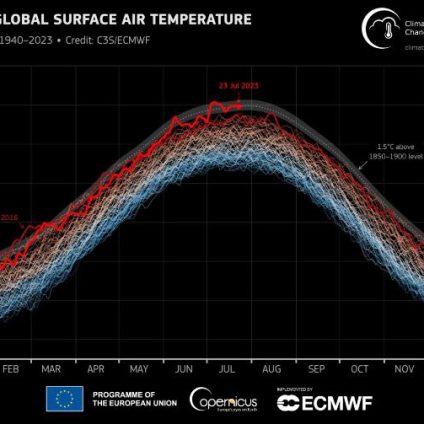In days, July will become the hottest month ever (not only compared to the months of July of past years). Copernicus: "improbable" that the record of July remains isolated, in the next few months the forecasts indicate temperatures "well above the average, exceeding the 80 percentile of the climatology for the period of the year"
Copernicus and OMM consider “extremely probable” that July takes the record
The concomitant heat waves over much of the northern hemisphere. Global ocean temperatures at levels never before touched. Especially in the North Atlantic and the Mediterranean. Fires have never been so widespread in Canada and more recent fires have been in Italy and Greece. These are some of the causes and consequences of the hot record in July 2023: according to Copernicus and the World Meteorological Organization, the month about to close will be the hottest July ever. Not only that, it will be the hottest month ever.
Read also July (2023) to global warming record
Hot record in July 2023 is “extremely likely”
When there are only a few days left until the end of the month, it is “extremely likely” that July 2023 will be “the hottest July and also the hottest month ever recorded, after the hottest June ever recorded”, say the two institutions, which are based on data provided by ERA5. The thermal anomaly of the heat record of July 2023 should be close to or just above the threshold of 1.5°C compared to the pre-industrial period. In short, we have just experienced our first month in the 1.5 degree warmer world that awaits us in the coming years if we fail to comply with the Paris Agreement. (Globally: at the European level, however, we have long exceeded this limit and are already well over 2°C).
Thermal anomalies marked worldwide

Since July 4, according to the University of Maine, the global average temperature has consistently remained above the previous record (16.92 ºC), reached in late July 2022 (for just one day). On 26 July it was still at 17.14 ºC after a peak of 17.23 ºC on 6 July.
Global ocean temperatures are also signalling strong anomalies, even from March without interruption. The thermal energy stored by the water is gradually released and helps to make more understood the waves of heat and extreme phenomena such as hailstorms and storm supercells that we have seen these days on Northern Italy. Each degree of additional temperature increases the humidity of the air by 7%, and then increases the amount of water vapor that can precipitate. Even more marked are the anomalies of the North Atlantic and the Mediterranean: the Mare Nostrum has just touched the average of 28°C, the highest ever recorded, and with weeks before the thermal peak that usually occurs in mid-August.
The heat waves of July 2023
The heat waves that have affected China, the United States and Southern Europe in the last two weeks – also extreme phenomena – have contributed to the record heat of July 2023. Different features make them extreme. Not only the temperatures reached, which in many cases have recorded new records locally, often breaking previous records of 1.5-2 degrees (usually the new records mark just a few decimals more). They are especially the concomitance of 3 great waves of extreme heat throughout the northern hemisphere and their duration and persistence to make them exceptional (for the “old” climate). An attribution study released this week points out, however, that these are now “normal” events in today’s climate, 1.1 ºC warmer. The heat wave in Europe will be repeated with similar intensity and duration at least once every 10 years. Without anthropic global warming it would have been virtually impossible.
2023 is increasingly projected towards the global warming record
With the probable record heat in July 2023, this year starts with more and more chances to beat 2016 and become the hottest year in history. All the more so since the long-term forecasts of Copernicus continue to indicate pronounced thermal anomalies in the coming months. “Record-breaking temperatures are part of the trend of dramatic increases in global temperatures. Anthropogenic emissions are ultimately the main engine of these rising temperatures“, comments Carlo Buontempo, director of the Copernicus Climate Change Service. “The July record is unlikely to remain isolated this year, C3S seasonal forecasts indicate that temperatures on land areas are likely to be well above average, exceeding the 80° percentile of climatology for the time of year“.













